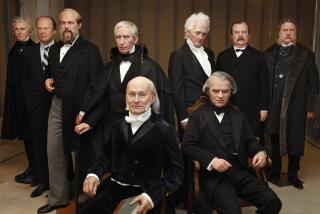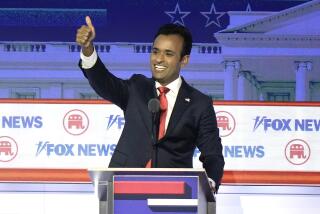Rejecting an Aristocracy of Experts : When Americans Elect Their King, He Must Be One of Them
Electing an American President is not like electing a European prime minister. Margaret Thatcher is not expected to be the symbol of English history and culture; for that, Britain has the queen. Thatcher is expected to be a brave leader and competent manager.
In the United States, however, our President must be even more than a prime minister; he must play the moral and symbolic kingly role, too. Presidents represent our culture and its changing times--they give their names to eras and to ages--as kings and queens do. Electing a President is in some ways like electing a king, not merely a prime minister.
That is the basic reason why Michael S. Dukakis’ campaign was misbegotten from the first. “This election is not about ideology,” Dukakis said in his moment of supreme triumph at his Atlanta nomination. “It is about competence.” He gave away his advantage in the polls right there.
In thinking that George Bush would be a pushover, Dukakis presented himself as an unsympathetic figure: He allowed himself to seem like a cold and imperious government boss, not a fatherly king. According to complaints from Democratic state offices, his Boston staff also conveyed a strong whiff of Northeastern arrogance.
But while Dukakis began running for prime minister, Bush was running for that and more--to be elected king. The difference lies in this: Dukakis has asked the people to admire him as a manager; Bush has been asking the people to identify with his values, style and favorite symbols, and to include him in their hearts when they say “one of us.”
Many analysts of presidential campaigns fail to grasp this secret of the presidential office. They think that the people want a manager, accountant, expert on the issues and articulate debater. They forget that the people want someone like themselves to become their most important public self-image. They want a person like themselves to stand against “enemies foreign and domestic.” The President is the people’s tribune against the Congress, the courts, the world.
This secret to the office of the presidency helps to explain the Republican lock on the Electoral College. In state after state, especially in the South and West, but also just beneath the surface in nearly every region, majorities of the people do not like the ideology, morals and arrogance of “the experts.” They are tired of experts telling them that they are wrong, stupid and immoral. They have learned by experience to dislike government officials, researchers, lawyers, judges, journalists and others.
Although Ronald Reagan is the President closest to the hearts of the people in recent memory, many of these experts contemptuously describe his grasp of reality as a tissue of “illusions.” Their own sense of reality is wildly different. They think of Reagan’s years as a “nightmare” that will pass away. They assert that the American people have been in a “daydream.” But President Reagan thinks of their sense of reality as a nightmare, too, one that in his view has thankfully passed.
Who is right? Whose are illusions, whose are realities? Sorting out which is which is the major business of our time. The experts have been wrong about Reagan from the start and the reality of peace and prosperity has vindicated him and frustrated them. And they can scarcely hide contempt for the millions who admire Ronald Reagan.
Why do the experts always seem to look down on those with whom they disagree? They are entitled to disagree, but not to think that their wisdom is of a superior type, higher than common sense.
This is why it has been so easy to win the affections of all those who feel scorned by the nation’s expert class. The people resent being held to be inferior. They retain the old-fashioned American belief that they, the people, are the source of all sovereign power. To them, the experts are usurpers.
And the governor of Massachusetts too often shows that he wants the esteem of the experts most of all. He looks down on his fellow Americans. He looks down on Bush and Dan Quayle as--in his word--”pathetic.” The point of view from which he speaks is often that of Harvard. His favorite language is Expertise.
Thus, the “feeding frenzy” of the press in New Orleans stirred a national backlash. It united all the scorned of America as one.
Those who would be king should not try to seem superior to the people. They should try to be worthy of the people’s friendship, love and bond of intimate identity, so that when the people choose which candidate is “one of us,” he is that man. He must be the vehicle of their dreams, even more than a manager, a king even more than a prime minister. And his sense of reality must be their sense, the other fellow’s the illusions they reject.
The latest class division in America is between the experts (who have disgraced the noble name “liberal”) and the ordinary people. The new aristocracy of experts is resented by the commoners.
I hope that we have a President soon who can heal that breach. It is one of the tasks of kings to heal and to unite, to be beyond party and to ennoble all. We are about to choose that king.
More to Read
Get the L.A. Times Politics newsletter
Deeply reported insights into legislation, politics and policy from Sacramento, Washington and beyond. In your inbox three times per week.
You may occasionally receive promotional content from the Los Angeles Times.










